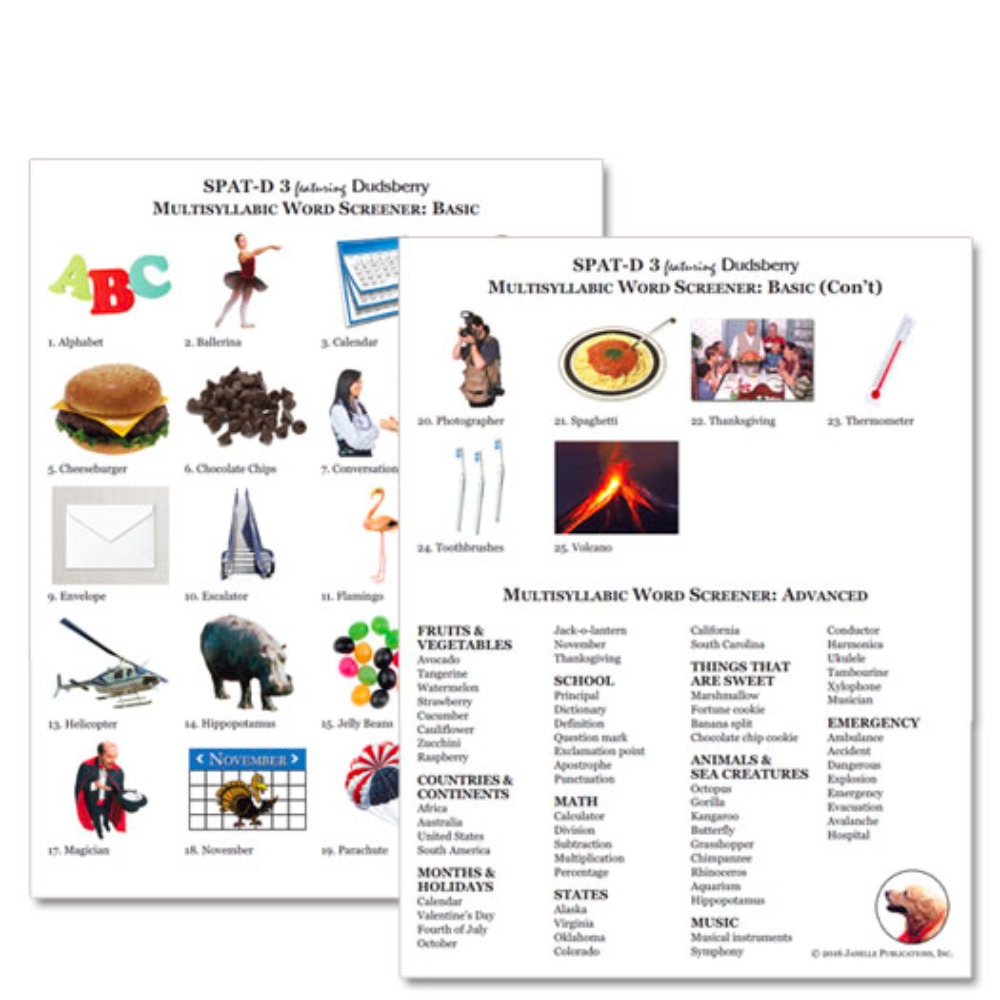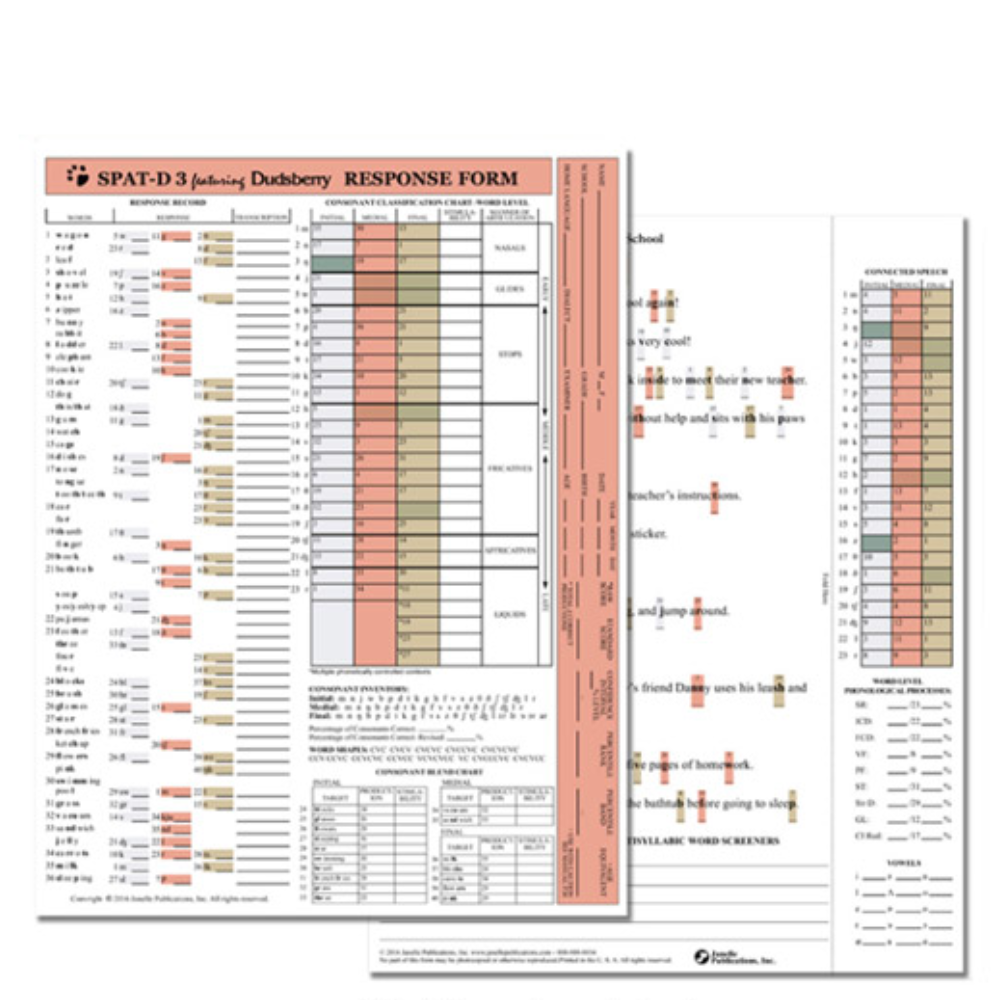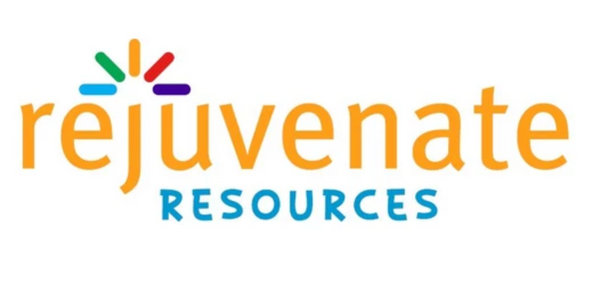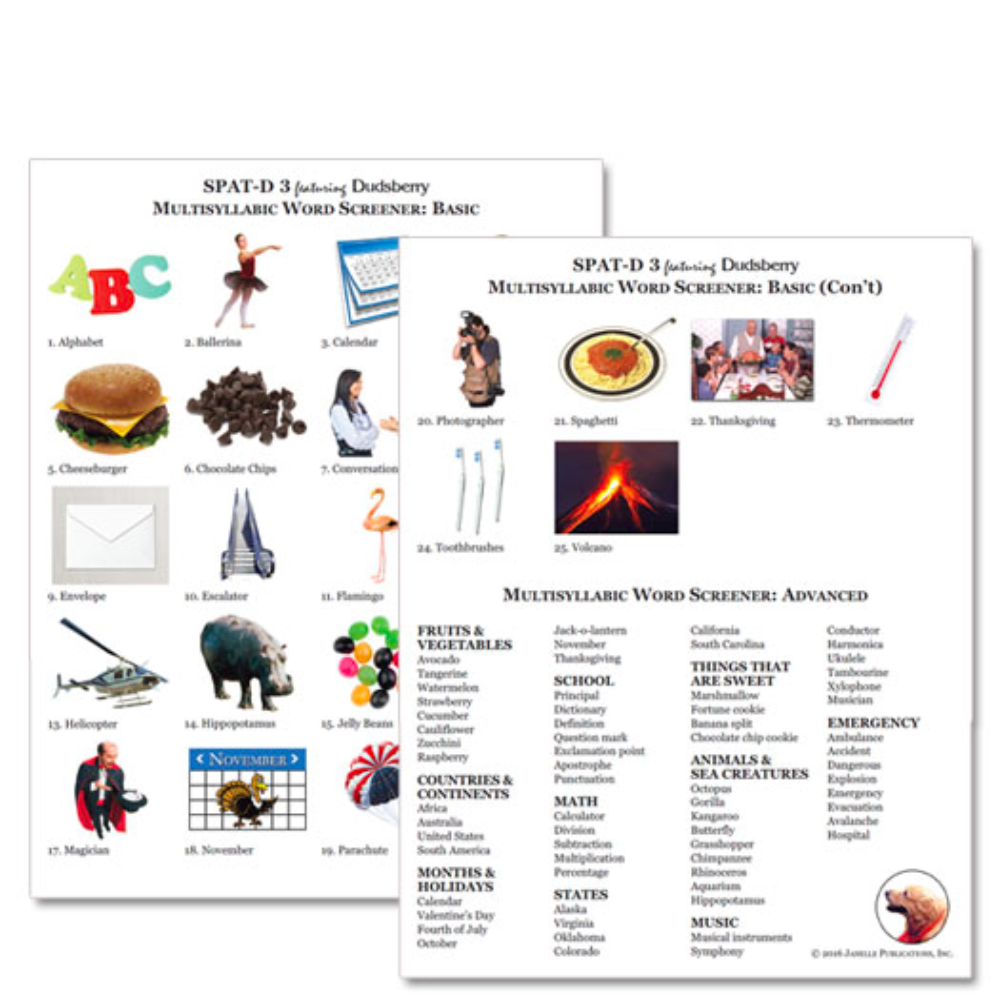The Structured Photographic Articulation Test (featuring Dudsberry) (SPAT-D 3)
The Structured Photographic Articulation Test (featuring Dudsberry) (SPAT-D 3)
Articulation and Phonological Assessment
By Patricia J. Tattersall, Ph.D. and Janet I. Dawson, Ph.D.
Grades Pre-K - 4 | Ages 3 - 10
SKU:#14238
Couldn't load pickup availability
- We Accept Purchase Orders!
- Fully Secured SSL Checkout
- 30-Day Return Policy
Share
Assess children's speech production to help create an effective, personalized treatment plan for speech disorders.
Ages: 3-7 (Basic), 7+ (Advanced)
Test Level: A
Testing Time: 15 minutes
- Strong quantitative and qualitative features
- An exceptional tool for assessing production in complex contexts
- An excellent resource for use with linguistically diverse speakers
An articulation assessment loved and trusted by speech professionals for more than 35 years!
More than 35 years since the introduction of Dudsberry at the 1988 ASHA Convention in Boston, the popular articulation test, The Structured Photographic Articulation Test, has once again been revised to provide clinicians with not only a quantitative tool but, in addition, a way to gather important qualitative information to assess the speech production skills of children ages 3 to 10. Results of the various quantitative and qualitative aspects of the SPAT-D 3 can be used for qualifying the child for services as well as developing goals, monitoring progress, and determining dismissal.
Third Edition: SPAT-D 3
The 5-year development process resulted in the new edition of the Structured Photographic Articulation Test, the SPAT-D 3, providing normative data based on a sample of over 2,400 children reflecting the most recent U.S. Census.
New Features of SPAT-D (Third Edition)
Assessment of Complex Contexts empirically linked to reading deficits (Kamhi & Catts, 1991)
Additional qualitative features of the SPAT-D 3 include:
- Consistency in sound production and intelligibility in connected speech utilizing the story of “Dudsberry’s Day at School”. Most words used in standardized assessment tools are one- to two-syllables; although appropriate for diagnosing a speech sound disorder, these contexts may not be as useful when considering discharge.
- Two Multisyllabic Word Screeners (Basic and Advanced) for qualitative assessment of consonants in complex contexts to aid in gathering data regarding the stability of sound production in more complex sound contexts and goal formulation for older children. The Multisyllable Word Screeners help evaluate whether children who have received services for speech sound disorders (phonological or articulation) and appear ready for discharge have the phonological skills necessary to meet grade level expectations set forth by the Common Core State Standards (CCSS) in Speaking and Listening as well as Reading and Writing:
- Basic: Ages 5-7 (picture stimuli)
- 25 target words
- 17-3 syllable; 7-4 syllable; 1 5 syllable
- Advanced: Age 7 and older (printed word lists)
- 65 target words
- Arranged by theme
- Can be used to create a unique word list for specific children based on their sound challenges
- Additional Languages and Dialects. SPAT-D 3 manual provides an in-depth guide for the influence on English production of the 6 most prevalent languages and dialects spoken in Canada to help determine a speech difference versus a true disorder
- Languages and dialects included in the manual:
- African American English
- Arabic
- Mandarin
- Spanish
- Tagalog
- Philippine
- General background on each language/dialect
- Presentation of shared phonemes and general patterns of typical deviation to aid in differentiating typical versus atypical influence on English speech
- Specific examples and considerations for interpreting performance on the SPAT-D 3 for each targeted language/dialect
Additional Highlights
- Normative tables for ages 3;0-9;11 based on a national sample from the four geographical areas specified by the current U.S. Census Bureau.
- 2,473 children from rural, suburban, and urban areas were tested by ASHA-certified clinicians.
- Thirty- six 4” x 6” real-life colour photographs of Dudsberry in a photo book serve as stimuli to spontaneously elicit the word-level production of 65 single consonants and 17 consonant blends.
- Standard scores, confidence intervals, percentile ranks, percentile bands and test-age equivalents for females and males, ages 3 to 10 provided.
- Validity, reliability, sensitivity and specificity, positive and negative likelihood ratios, and bias data included and support the use of the SPAT-D 3 as part of the assessment protocol for a child suspected of a speech sound disorder.
- Colour-coded response form enables the examiner to immediately analyze articulation errors according to syllabic function and manner of articulation, no whole-word transcription is necessary.
- Response forms include sections for recording consonant inventory, percentage of consonants correct (PCC) and PCC-Revised, word shapes, and vowels inventory.
- Common phonological processes can be assessed.
- Phoneme production in connected speech is assessed utilizing the story of “Dudsberry’s Day at School” (8 photos) to determine consistency in sound production across contexts (word-connected speech).
- Multisyllabic Word Screeners target syllable fidelity and stress in addition to sound production/stability.
- A separate response form for Multisyllabic Word Screeners are provided.
SPAT-D:3 Administration
- Administration of the quantitative (standardized) portion of SPAT-D 3 takes approximately 15 minutes. A colour-coded response form allows for quick and easy scoring.
- Administration of optional qualitative portions of the test will vary based on the child's unique profile and the clinician’s purpose in administering the testing.
The SPAT-D 3 Articulation Test Kit Includes:
- Manual
- 44 colour photographs (4”x6”) in a bound album
- 30 response forms
- Laminated page of eliciting statements
- Laminated multisyllabic basic screener photo sheet
- Sturdy storage box







